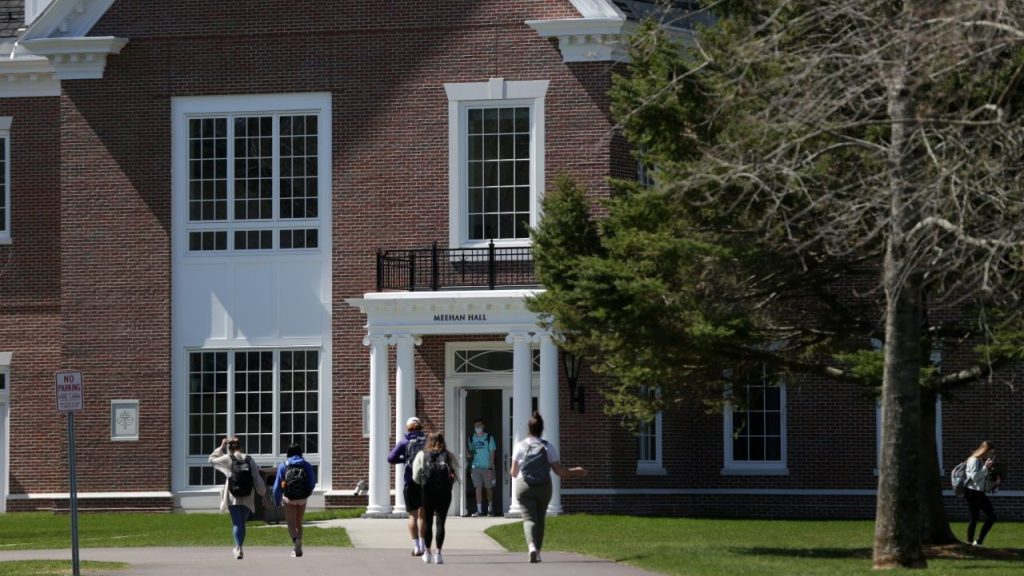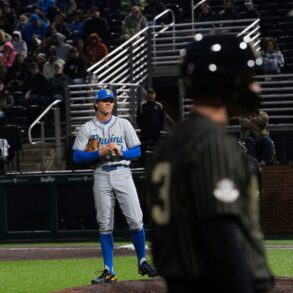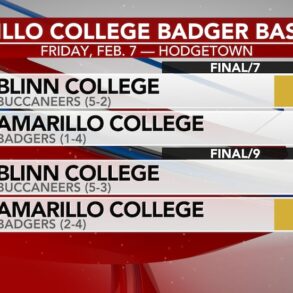
A day after a federal judge in Wisconsin enjoined the NCAA from enforcing its five-year rule on University of Wisconsin football player Nyzier Fourqurean, a federal judge in Massachusetts on Friday upheld the NCAA enforcing its five-year rule on former Stonehill College baseball player Trey Ciulla-Hall. Ciulla-Hall seeks to join the University of Maryland as a grad student and play for the D-I Terrapins.
U.S. District Judge Denise J. Casper reasoned that Ciulla-Hall, a first baseman who led the Skyhawks in home runs (15), RBIs (54), slugging percentage (.668) and several other categories last year, did not establish the necessary elements for a preliminary injunction. Through attorney Christopher M. Markey, Ciulla-Hall sued the NCAA on Tuesday for alleged antitrust violations. He also sought an injunction by Friday given that Maryland’s deadline for class registration ends on Friday for him to be able to play in spring 2025.
Ciulla-Hall, who graduated from Brocton (Mass.) High School in 2020, played in 21 of the Skyhawks’ 32 games in 2021, a year when Stonehill was in NCAA D-II (the school moved up to D-I starting in the 2022-23 academic year). Ciulla-Hall missed several games in 2021 due to his mother suffering from a serious illness. He played complete seasons in 2022, 2023 and in 2024, when he led the Northeast Conference in OPS (1.112). Ciulla-Hall graduated from Stonehill last May.
Ciulla-Hall would like to attend Maryland in part to earn from NIL opportunities and from revenue sharing proceeds should U.S. District Judge Claudia Wilken grant final approval of the NCAA’s settlement in the House, Carter and Hubbard antitrust litigations. He warns that he would be unable to pursue a desired master’s degree at Maryland unless he can keep playing baseball and receive accompanying earnings.
But Ciulla-Hall is ineligible to play under NCAA Bylaw 12.8, better known as the five-year rule. The rule limits an athlete’s participation in NCAA sports to five calendar years from when the athlete begins studying at a college and four seasons of intercollegiate competition in any one sport.
Ciulla-Hall maintains he should have received a waiver for his 2021 season given that circumstances beyond his control—his mother’s health and resulting financial and time consequences—caused him to miss some of the season.
Although Casper expressed sympathy for Ciulla-Hall’s situation, she concluded that he came up short in establishing grounds for a preliminary injunction—which the judge stressed is “an extraordinary and drastic remedy” in law.
Casper said she was “not convinced” the NCAA incorrectly applied its own rules. The judge noted that the Skyhawks played 32 games in spring 2021 and Ciulla-Hall played in 21 of those games. Those benchmarks, Casper noted, meant that Ciulla-Hall played in a season that counts under NCAA rules.
The judge also reasoned that Ciulla-Hall has not established a likelihood the NCAA and its member schools violated antitrust law by denying his eligibility. Casper noted that Ciulla-Hall hasn’t “pointed to evidence” showing that denial of his eligibility reflects harm to the marketplace for college athletes. The judge also cited precedent standing for the proposition that judges reviewing NCAA rules should take caution before entering injunctions. Otherwise, she mentioned, judges run the risk of intruding on complex business arrangements. Casper also underscored that her denial of a preliminary injunction does not mean Ciulla-Hall will necessarily lose his case.
In a footnote, Casper acknowledged Thursday’s ruling by U.S. District Judge William M. Conley to prohibit the NCAA from enforcing the five-year rule on Fourqurean, who, like Ciulla-Hall, challenges the counting of a D-II season in which he missed games for family reasons. A ruling in a federal district court in Wisconsin is not binding precedent on the same level court in Massachusetts. Casper also stressed that Conley’s ruling “does not warrant a different outcome here on the present record.”
The NCAA was represented by Keith P. Carroll and other attorneys from Holland & Knight in opposing Ciulla-Hall’s motion.
In a statement shared with Sportico, an NCAA spokesperson said Casper’s ruling “is a reflection of our longstanding commitments” to efforts by the NCAA and member schools “to provide word-class athletics and academic experiences for student-athletes that foster lifelong well-being.” The NCAA also stressed its eligibility rules “are designed to help ensure competition is safe and fair—aligning collegiate academic and athletic careers to provide high-level opportunities and benefits to hundreds of thousands of student-athletes.”
Although the NCAA has seen judges issue injunctions in favor of Fourqurean and Vanderbilt quarterback Diego Pavia—who is challenging NCAA eligibility rules concerning junior college transfers—the NCAA has scored several legal wins over the last year in addition to its new success over Ciulla-Hall.
Specifically, the NCAA has thus far prevailed in a case brought by two former Overtime Elite (OTE) players—twin 20-year-old brothers Matt and Ryan Bewley—who failed to persuade a judge that compensation for playing in OTE counts as NIL. The NCAA has also thus far succeeded in a case brought by University of North Carolina tennis player Reese Brantmeier challenging NCAA prize money rules. Moreover, last December, the Supreme Court of Mississippi ruled in favor of the NCAA in a case challenging the constitutionality of NCAA enforcement actions.
A track record of divergent court rulings over eligibility rules might prove politically advantageous for the NCAA, which has pushed for Congress to advance legislation that would insulate the NCAA and its member institutions from antitrust challenges over eligibility rules. The NCAA can argue that without immunity from antitrust challenges, rules that serve to distinguish the unique features of college sports from pro sports will continue to attract lawsuits and beget conflicting court rulings. The erosion of those rules could potentially diminish fan and consumer interest in college sports.
This post was originally published on this site be sure to check out more of their content.









